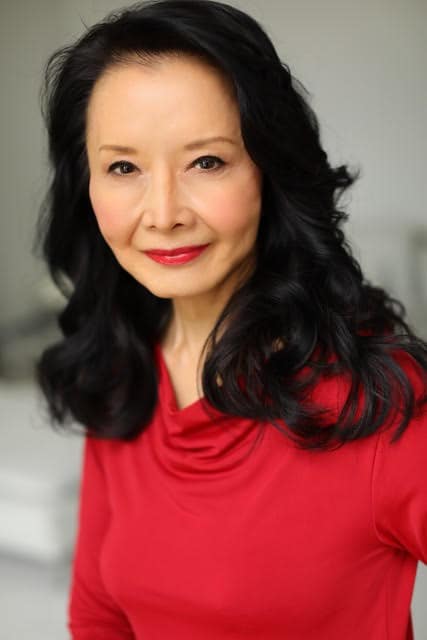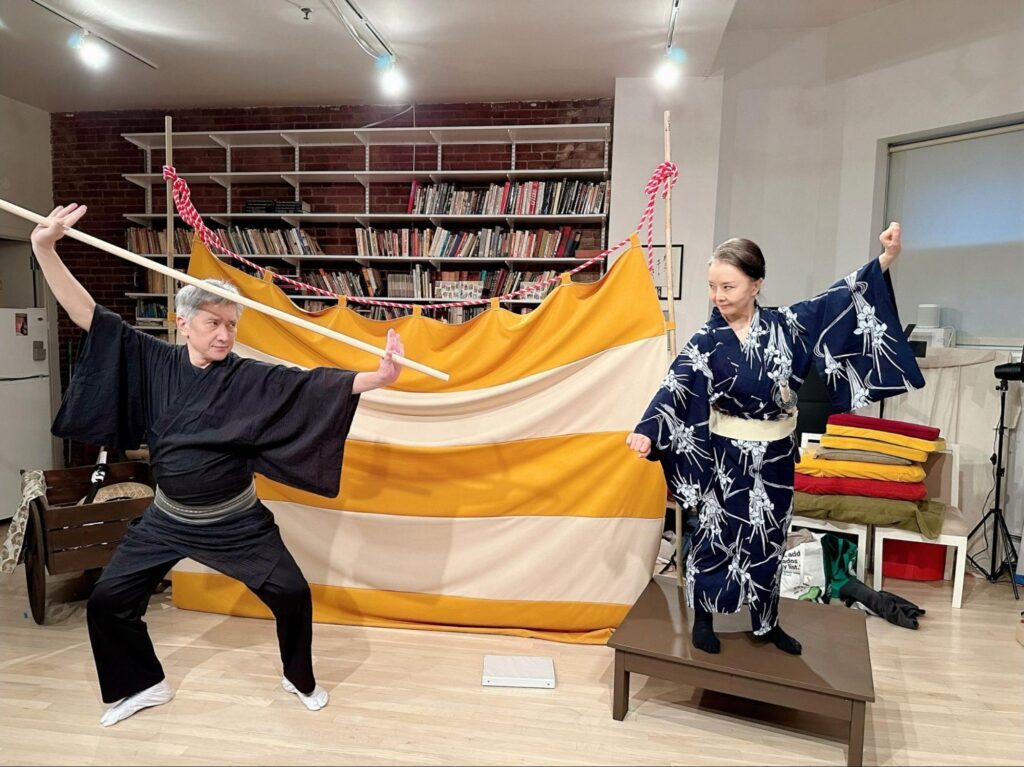In a city where the theater pulses with tales from every corner of the world, Ako Dachs brings to life an ancient story of defiance and creativity with her new play, Okuni. Set to premiere at Theatre Row in New York on November 2, 2024, Okuni tells the story of the woman who birthed Kabuki, one of Japan’s iconic art forms. This production is the latest undertaking by Amaterasu Za, a bilingual, cross-cultural theater company founded by Ako in 2018 to bridge Japanese and Western theatrical traditions. With Okuni, Ako—who is not only the writer, director, and choreographer but also stars as Okuni—continues her mission to share Japanese theatrical heritage with the world.
“I found her story really intriguing and very inspiring,” Ako says, discussing what initially drew her to Okuni. “The idea that a theater tradition so famous for being performed entirely by men was actually created and popularized by a young woman, who portrayed both male and female characters, was something I wanted more people to know about.” In Okuni’s story, Ako sees the spirit of creativity, resilience, and a rebellion against societal norms—qualities that resonate strongly today.

Photo Courtesy: Amaterasu Za
In the early 1600s, Okuni defied the rigid gender roles of feudal Japan. She formed an all-female troupe that performed vibrant, sometimes satirical skits and dances along the riverbanks of Kyoto. Drawing from Noh theater, religious dances, and local peasant festivals, Okuni’s performances bridged the gap between the ruling classes and the common people. Her audiences were captivated, and her fame grew swiftly. But with success came opposition. As her troupe drew crowds, brothel owners saw an opportunity, adapting her performances to lure patrons and expanding their businesses beyond the pleasure quarters. The government intervened, banning women from Kabuki—a prohibition that ultimately led to its transformation into an all-male art form.
Ako, who grew up in Japan immersed in its varied performance traditions, feels a personal connection to Okuni’s experience. “When I was 16, I was accepted into the Takarazuka Revue Company, the famous all-female troupe where, like Kabuki’s male performers, we played both male and female roles,” she explains. This early experience in cross-gender casting gave her unique insight into the complexities of gender and identity on stage. She later studied with a Kabuki dance master, Murasaki Fujima, and eventually became a certified Kabuki dance instructor.

Photo Courtesy: Amaterasu Za | Yasushi Kimura and Ako
In Okuni, Ako draws on her extensive training in Kabuki and traditional Japanese performance, as well as her experiences in American theater, film, and television. “In the end, there wasn’t a ready-made vehicle to tell this story, so I had to create it myself,” she says. Her production combines elements of authentic dance, live music, dialogue, and narration to create a dynamic performance. “I wanted to celebrate Okuni’s spirit, not in a scholarly documentary sense but by bringing her to life for audiences today. She created a theater for the people, and that’s what Kabuki still represents.”
At the heart of this production is Amaterasu Za, Ako’s theater company dedicated to presenting Japanese works to new audiences, often blending Japanese and Western theatrical traditions. Amaterasu Za, named after the Japanese sun goddess Amaterasu, was founded with a mission to make Japanese theatrical heritage accessible to English-speaking audiences, while giving Japanese-speaking viewers a chance to see their culture reflected on stage. “In the US, local culture is so strong that it can drown out other traditions,” Ako notes. “But people who love theater would love the theatricality of Japanese work, which has so much to offer in how it packs lived emotion into something that doesn’t have to be so literal or realistic.” Amaterasu Za is Ako’s way of fostering cross-cultural exchange, bringing Japanese theater’s unique blend of symbolism, abstraction, and movement to American audiences.
The historical evolution of Kabuki provides rich ground for exploring themes of gender and performance. “Who knows how Japanese theater might have evolved if women had been allowed to participate for the last 400 years?” Ako wonders. “The shift was driven by the perceived corruption of public morals, not by any inherent issue with women on stage. The brothel owners’ exploitation of Okuni’s art led the government to say, ‘No women.’ Ironically, they allowed young men to take over, then eventually only mature men.” Ako’s adaptation highlights the tragedy of this historical shift while honoring the legacy Okuni began. In the male-dominated Kabuki world, where actors in their seventies can still brilliantly portray young courtesans, Ako sees both beauty and missed opportunity.
Language and accessibility present unique challenges in staging bilingual productions for diverse audiences, yet Ako approaches these with a deep commitment to connection and inclusivity. Okuni will be performed in Japanese with English subtitles and thematic narration, designed to engage audiences from different linguistic and cultural backgrounds. “We use projected titles to translate, so both Japanese-speaking and English-speaking audiences can follow along. Sometimes, it’s in English with Japanese titles, sometimes in Japanese with English titles, and sometimes both,” she says.
Amaterasu Za has garnered acclaim for its commitment to sharing Japanese stories rarely seen on American stages. Its productions, whether in Japanese, English, or a blend of both, offer a portal into a different cultural framework. During the pandemic, the company live-streamed performances and offered staged readings, including an all-female Oedipus Rex and a Japanese-language Macbeth, expanding its outreach even further.
Looking ahead, Ako has ambitious plans for Amaterasu Za. “I’d like to remount a play about Kyoko Hayashi, a survivor of Nagasaki,” she shares. Written by Eiko Otake, the piece delves into the profound human consequences of atomic warfare, a story Ako feels needs to be told, especially given her dual identity as a Japanese artist living in the U.S. Another exciting project on the horizon is a multi-Asian Macbeth, where each character would be played by actors from different Asian backgrounds, each performing in their native language. “We might have a Korean Macbeth, a Thai Malcolm, a Vietnamese Duncan, all using costumes and movements from their own theatrical traditions. Shakespeare’s plays are so well-known that they can withstand this kind of cultural reinterpretation.”
As Ako prepares to take the stage as Okuni, she is not only reviving the story of a pioneering woman but also challenging audiences to consider the lasting impact of her legacy. Okuni’s journey—from a young performer creating art on the banks of a river to the founder of a centuries-old tradition—is a testament to the enduring power of innovation and resilience. For Ako, it’s an opportunity to honor a remarkable woman whose life and art continue to inspire.
In Okuni, Ako Dachs has crafted a fitting tribute to a woman who dared to defy convention, reminding us of the countless women, past and present, who have shaped and enriched our cultural landscape. For Ako, Okuni’s legacy isn’t just a story of a pioneering performer—it’s a call to celebrate the power of female creativity, resilience, and vision across time and borders
————————————
Okuni will be performed at Theatre Row at 410 West 42nd Street, NYC
Joining Ako* on stage is Yasushi Kimura, with musician Fumi Tanakadate. The design team includes lighting design by Aaron Bowersox, set designed by Josh Dachs, projection design by Cinthia Chen, sound design by Chad Raines, costume design by Ako Dachs, wig design by Mitsuteru Okuyama, original composition by Fumi Tanakadate and Ako Dachs, production stage manager is Madeleine Blossom*, assistant stage manager is Sabrina Morabito* and Kanako Morita is the assistant producer.
For more information, please visit www.AmaterasuZa.org
Published by: Khy Talara
















